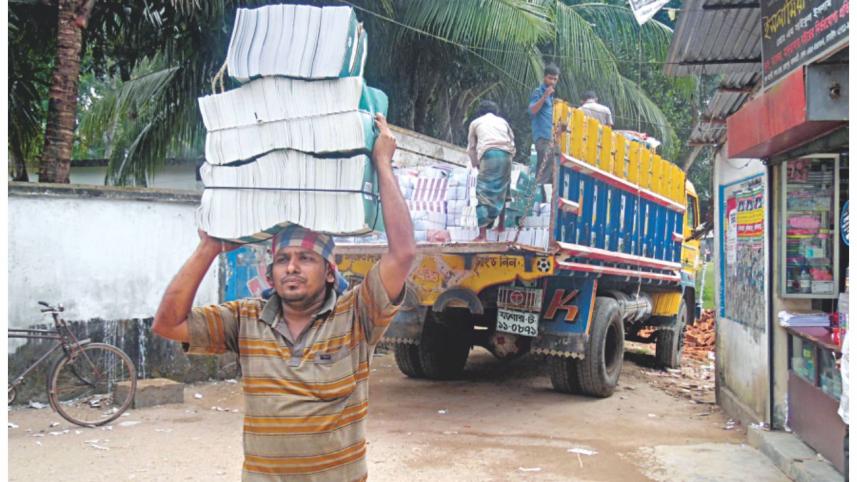Half of books not ready yet

With just about 20 days before the new academic year, only half of the total primary school textbooks have been printed and dispatched to different upazilas for distribution. The task is almost complete for the secondary-level books.
Failure to commence the printing task in time along with a move by some dishonest paper suppliers to make a fast buck is to blame for the apparent delay, say officials concerned.
Only half of more than 10.87 crore copies of the primary textbooks have been printed and sent to different upazilas till yesterday, according to the data of National Curriculum and Textbook Board (NCTB), the body looking after the government's book distribution scheme.
On the contrary, around 97 percent of some 16.30 crore copies of textbooks for secondary schools students are already in the upazilas.
However, both the government and printers believe that they would be able to deliver the free textbooks to the children in time like they did in the last five years.

The printers as well as the NCTB are working round-the-clock to meet the target of dispatching 33.37 crore copies of new textbooks to around 4.4 crore students from class I to X across the country. The project is costing the government around Tk 733 crore.
"We hope all books will be sent to the destinations much before the deadline ends as 97 percent of the secondary textbooks have already reached the upazilas," Mustak Ahmed Bhuiyan, distribution controller of the NCTB, told The Daily Star.
December 25 has been set as that deadline while the government would start distributing the books on January 1, next year.
Around 92 percent of 3.39 crore Dakhil (secondary level of madrasa studies) and Dakhil vocational textbooks have been sent to the upazilas while 94 percent of around 1.92 crore ibtedai (primary level of madrasa studies) and 96 percent of 22.71 lakh SSC vocational books are already there, said NCTB officials.
In case of primary books, the scenario is quite different.
"As per our latest data, around 50 percent of the primary books have been dispatched. But, we hope to complete the task within the given time," said NCTB official Ratan Siddique.
A delay of more than a month by the printers in initiating the printing task is the main reason for the slow progress of work.
The government over the years has been selecting printers for primary textbooks through international tenders. The NCTB this year invited international tenders on April 29. Some 22 local printing firms submitted lowest bids of Tk 221 crore, a much lower price than the estimated cost.
The printing of primary textbooks hit a snag in mid-August when World Bank set some conditions for the winning bidders, according to printers and NCTB officials.
The WB, which lends the money for around 10 percent of the primary textbook costs, sought to check the quality of books during printing and in upazilas. The bank wanted to pay the printers only if it found their work satisfactory.
The bidders rejected outright the conditions. They finally agreed to do the work in the first week of September upon assurance from the government high-ups that some of the conditions would be relaxed.
"It took more than a month to settle all these issues," said Shahid Serniabat, president of Bangladesh Mudran Shilpa Samity.
He said the printers had faced other “problems” from the paper suppliers.
Initially, some paper mills, in association with many guidebook publishers, created an “artificial crisis” of papers. They wanted their notebooks to hit the market during the distribution of free books, he alleged.
After the issue was resolved, some mills suddenly increased the price of papers by 15 percent from the contract price, citing the hike in gas and electricity prices, he said.
He, however, said they were confident that the free books would be sent to their destinations within the given time, despite all the hurdles.
According to a source, some printers are using low quality papers for their books. Asked, Serniabat did not deny the allegation completely.
"We will get good papers if the mills stop supplying those to the guidebook publishers. We have urged the mill owners and Pustak Prakashak O Bikreta Samity [Book Publishing and Selling Association] to take initiatives in this regard," he said.
Asked about the matter, NCTB official Ratan Siddique said they had a mechanism to check the quality of papers. Some samples were checked but no such report has been found yet, he claimed.




 For all latest news, follow The Daily Star's Google News channel.
For all latest news, follow The Daily Star's Google News channel.
Comments